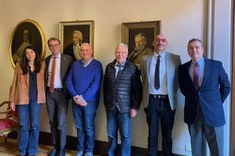The Strength of Made in Italy: A Country as a Brand

The series of research stories told by young researchers stems from the PhD Storytelling initiative, in which PhD students engage with expert science communicators from the University of Bologna and professionals from UGIS (Italian Union of Science Journalists). This article is authored by Veronica Pasini, a PhD student at the Department of Architecture.
"Made in Italy" conventionally refers to products and goods whose production process is carried out mainly in Italian territory, although the definition of “Made in” is far more complex and cannot be reduced to these terms alone. In any case, attributing a product to its country of origin determines what is more commonly called the “country-of-origin effect,” which reflects the very identity of the country on the product, conveying positive values such as reliability and quality. The Made in Italy label therefore promises quality and evokes a tangible sense of Italianness, recalling the emotions experienced by foreigners visiting Italy, thanks to its stunning landscapes, exceptional food, and “dolce vita.”
Small and Medium Enterprises (SMEs), which account for 41% of national revenue (Confindustria analysis of 2021), play a key role in contributing to the production of Made in Italy. The digitalisation of this sector would make a significant contribution to the development of the entire national economic system, and this is the focus of my research project.
For years, the Made in Italy sector has been navigating the shift towards “Industry 4.0,” the challenge of artificial intelligence and big data, and now also the transition towards ecological sustainability in the face of climate change and the environmental targets set by the EU—not to mention the rising energy costs caused by recent international conflicts.
Thus, it is essential to create a real value chain: Made in Italy should not just be a concept but must be approached as both a cultural and design paradigm. From there, it could be transformed into a concrete model of sustainable consumption.
The research project “Transition Beyond Sustainability: Advanced Design as a Mediator and Activator of Circular, Collaborative, and Regenerative Processes for Small and Medium-Sized Enterprises” aims to develop a digital platform that involves small and medium-sized enterprises producing Made in Italy goods, particularly within the three key industries of furniture, fashion, and automation, which often share common raw materials.
The goal is to create a network for the exchange of materials and resources, optimising processing and production cycles while also actively fostering partnerships and viable solutions for reinvesting waste materials and by-products. The platform will also connect businesses with public administrations, ensuring continuous updates on the environmental criteria necessary for eco-design.
To further promote the concept of Made in Italy, the platform will facilitate the sharing of knowledge about the reuse of waste materials, contributing to the creation of a self-sustaining innovation ecosystem that enhances the use of new materials within the circular economy—the true drivers of this new era.
The platform is not only designed as a resource-exchange hub or a marketplace that connects supply and demand. Instead, it aspires to a broader ambition: to establish cross-sectoral coordination among the various Made in Italy production chains, guiding companies through their transition to more sustainable business models.
By strengthening communication, planning, and training, and by facilitating collaboration between SMEs and public administrations, this platform will yield several benefits. For instance, it will enhance cross-sectoral skills, enabling greater mobility between supply chains, gradually optimising processes, reducing costs associated with waste and by-products, and extending their lifecycle.
In summary, the new platform aims to address several key areas: promoting the role of suppliers as “prosumers”—conscious consumers and active participants in the search for innovative, responsible, and inclusive solutions—thus strengthening the value chain of the final product; encouraging collaboration between businesses and public administrations to facilitate more targeted and effective innovation policies; and integrating specialised professionals who can provide tailored support, streamlining the transition process. Lastly, it will promote the cross-industry reuse of waste materials.
With the support of this platform, companies will gain the ability to monitor their entire production process—not just the individual product—while also accessing key metrics to evaluate their business models, such as the environmental, social, and economic impact of their operations.






